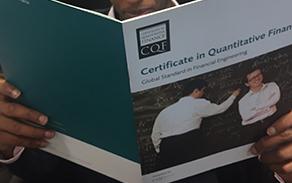Finding My Way in Quant Finance from Brazil through London, Stockholm, and Copenhagen
July 2021
CQF Alumni Story: Leticia Mortoza, Senior Quant, Swedbank

Although I live in London now, I am originally from Brazil and I started my academic studies with a bachelor’s degree in Economics. However, as I began working in the field, I heard many times that economists don’t know much about calculus and this was seen as a fairly serious weakness. Personally, I had always loved mathematics and wanted to address this issue, so I took a master’s degree in Finance, but I found that it still did not bring out the quantitative skills that I was seeking. Then I decided to take a MBA in Financial Engineering and with it I had an interesting opportunity to switch disciplines and enrolled in a PhD program in Electrical Engineering. That allowed me to pursue quantitative roles in different cities located in different countries, from Sao Paulo, through London, Stockholm, and Copenhagen.
I thought about doing an MFE but decided that it was practical quantitative skills not degrees I needed. Then I learned about the Certificate in Quantitative Finance (CQF) and it was a wonderful solution.
Even with the academic studies and work experience, I still felt that something was missing. I thought about doing an MFE but decided that it was practical quantitative skills not degrees I needed. Then I learned about the Certificate in Quantitative Finance (CQF) and it was a wonderful solution. It was clearly a very practical approach to learning, it was part-time, complementary to my work schedule, and could be completed in 6 months. I was already very accustomed to working and studying at the same time, so this was simply a continuation of my normal life: working during the day in a bank, going to evening classes, and then studying on the weekends. I enjoyed the modules very much and I was particularly curious about credit securitization pricing. For this reason, I chose to price a N-th to Default CDS Basket as my final project, which helped me in one of my jobs, as I had some familiarity with intensity models and we were able to get some model validation time-sensitive work done rather quickly. Now, after more than 5 years working with model validation, I’m ready to move to a model development role.
For prospective delegates, I would certainly recommend the CQF and would also suggest that they gain some experience in the markets either before or during their studies. If you are taking a bachelor’s degree now, consider doing an internship that will place you in a bank or investment firm. You will just gain a different understanding of the world and how to apply your knowledge and ideas this way. And of course, once you complete the program, you have access to the alumni lectures and the new CQF classes as they come along, so it is very good to stay in touch and keep your skills fresh. It is a tribute to Lifelong Learning and is very rewarding along the way.
To find out how you could transform your career with the CQF program, please download a brochure or join the next online information session to hear more and ask questions to the CQF Program Director.




